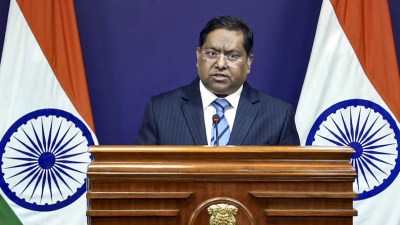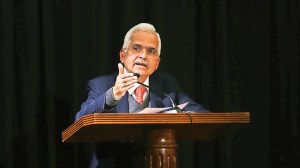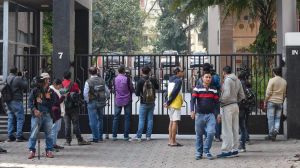Ex-spy upstages platform performer
He left his wife at home, took tea with the Queen, and totally upstaged Tony Blair with a tub-thumping defence of his Chechnya war. At lea...

He left his wife at home, took tea with the Queen, and totally upstaged Tony Blair with a tub-thumping defence of his Chechnya war. At least that was how the British press summed up President-elect Vladimir Putin8217;s first visit to a Western capital since he won power last month.
8220;A bravura performance,8221; The Times trumpeted of Putin8217;s five-minute tirade against the West for opposing his offensive in the Caucasus republic on the grounds of widely documented brutality. Putin8217;s outburst 8220;dominated8221; his joint press conference with British Prime Minister Tony Blair and 8220;made chillingly clear that the new master of the Kremlin is in the business of giving lessons, not taking them,8221; The Times reported.
8220;Mr Putin upstaged Tony Blair at a press conference8230;with his denunciation of the Chechen rebels,8221; The Telegraph added, noting Putin8217;s warning that Europe could suffer unless it woke up to 8220;the Islamic terrorist8221; threat in the North Caucasus.
Putin was warmly welcomed by Blair, who rolled out the red carpet for his guest at Downing Street. The Russian leader also gained an audience with Queen Elizabeth II at Windsor Castle. He even found time to court British business leaders and urge them to invest in his new Russia, all within 24 hours.
While Putin8217;s passionate plea for understanding over Chechnya won him grudging admiration, Blair8217;s controversial role in inviting the so-called Butcher of Grozny8217; to London came under much harder scrutiny. 8220;For once in his career, Tony Blair found himself completely outclassed as a platform performer,8221; The Times said, adding that the British leader 8220;did not sound entirely confident8221; when he voiced his concerns over Chechnya.
Blair has been widely criticised for agreeing to host Putin even as Russian forces persist with the ferocious effort to wrest control back in Chechnya. The Independent said Blair8217;s 8220;rush to embrace Vladimir Putin has been risky and almost indecent in its haste8221;.
But the press also noted the realpolitik of the occasion, seeing the Blair-Putin show as a first step towards a new era of relations between Moscow and the West. Blair 8220;appeared to have struck up the closest relationship between a Russian leader and a British Prime minister since Mikhail Gorbachev and Mrs Thatcher found they could do business together8221;, The Telegraph said.
Added The Independent: 8220;The uproar over Chechnya masks the fact that we may be at a turning point in relations with post-Soviet Russia.8221;The Left-leaning Guardian was less convinced, pooh-poohing the idea that by opening up to Putin, Blair might have won pole position for Britain in any race to grab investment opportunities in Russia. 8220;The suggestion that British business might get a head-start in the reformed Russian economy is as dubious in its premise as its conclusion: the economy has yet to be reformed. Ethics? Schmethics. A hard man is sucking up to a harder one.8221;However, Putin himself cannot have any regrets about breaking his own ban on travelling abroad before his inauguration. His maiden visit to Britain paid rich dividends.
The former spy seemed transformed into a pro-Western leader keen to restore order in Russia and push forward reforms. 8220;There is no doubt he talks our language on reform,8221; Blair told the joint news conference with Putin.Putin is not yet another darling of the West, like Gorbachev. But his point about restoring order without sacrificing liberal values clearly impressed western investors in London. 8220;It will be quite impressive if he does half of what he says,8221; one of the businessmen said after the meeting.
Russia8217;s newspapers too were all praise for Putin, saying he had won a vital victory in talks with Blair and wooed the business community. 8220;Russia has been accepted into high society,8221; Kommersant newspaper wrote. 8220;It seems that over the next decade, the tone of world politics will be on the 40-year-old generation8217;.8221; The visit, the paper was sure, would ensure Russia8217;s place as a main player in international politics. Russia8217;s press, which used to be forced to play down former president Boris Yeltsin8217;s gaffes on international visits, revelled in pointing out that in London, the former spy showed 8220;subtle diplomacy8221; and was friendly with Blair. 8220;Putin and Blair like each other and they don8217;t hide it,8221; the daily Izvestia wrote beneath a photograph of Putin looking up at a smiling Blair. 8220;In London Putin and Blair chatted calling each other Vladimir and Tony, smiled, cheered each other up all the time,8221; Kommersant gushed. The press also praised Putin8217;s meeting with leading British businessmen, withVremya MN noting: 8220;Putin said exactly what they wanted to hear.8221; And most importantly, the papers said, Putin8217;s international debut put Russia firmly on the diplomatic map. 8220;What did he get from such friendliness in London?8221; Sevodnya asked in its article. 8220;Putin got the chance to play a more marked role in the European arena, and to leave the shadow of the big American brother.8221;
Ahead of coming to Britain too, Putin made efforts to eagerness to improve relations with the West. The Russian Parliament also ratified the US-Russian START-II Arms Reduction Treaty that had been delayed for seven years. During the visit, Putin backed a newly-formed independent group set up to investigate reports of human rights violations in Chechnya. Despite protests by human rights groups, Queen Elizabeth received Putin, underlining how important the visit was to Britain.
Putin also won a promise from Blair to mediate in Russia8217;s row with Washington over plans for a US anti-missile defence network. Russia feels threatened by US plans. Moscow has so far rejected US proposals to amend the ABM pact and has threatened to reconsider its part in other arms treaties if they went ahead. But on Monday, Putin signalled that Russia was ready for a compromise. And on Tuesday, the head of the Duma8217;s International Affairs Committee said the chamber8217;s council had decided to put the CTBT to the vote on Friday.
- 01
- 02
- 03
- 04
- 05































